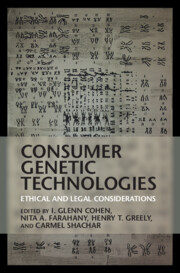Book contents
- Consumer Genetic Technologies
- Consumer Genetic Technologies
- Copyright page
- Contents
- Contributors
- Acknowledgments
- Introduction
- Part I Consumer Genetic Technologies: Rights, Liabilities, and Other Obligations
- Part II Privacy in the Age of Consumer Genetics
- Part III Tinkering with Ourselves: The Law and Ethics of DIY Genomics
- Part IV Consumer Genetics and Identity
- Part V The Impact of Genetic Information
- Introduction to Part V
- 17 An Ethical Framework for Genetic Counseling in the Genomic Era
- 18 Physician-Mediated Elective Whole Genome Sequencing Tests
- 19 Privacy Best Practices for Direct-to-Consumer Genetic Testing Services
- 20 Regulatory and Medical Aspects of DTC Genetic Testing
18 - Physician-Mediated Elective Whole Genome Sequencing Tests
Impacts on Informed Consent
from Part V - The Impact of Genetic Information
Published online by Cambridge University Press: 27 August 2021
- Consumer Genetic Technologies
- Consumer Genetic Technologies
- Copyright page
- Contents
- Contributors
- Acknowledgments
- Introduction
- Part I Consumer Genetic Technologies: Rights, Liabilities, and Other Obligations
- Part II Privacy in the Age of Consumer Genetics
- Part III Tinkering with Ourselves: The Law and Ethics of DIY Genomics
- Part IV Consumer Genetics and Identity
- Part V The Impact of Genetic Information
- Introduction to Part V
- 17 An Ethical Framework for Genetic Counseling in the Genomic Era
- 18 Physician-Mediated Elective Whole Genome Sequencing Tests
- 19 Privacy Best Practices for Direct-to-Consumer Genetic Testing Services
- 20 Regulatory and Medical Aspects of DTC Genetic Testing
Summary
The April 2018 arrest of the alleged Golden State Killer has ignited law enforcement interest in using consumer genetics platforms to solve crimes. Proponents of using genetic genealogy to solve crimes have argued that the genetic data on which these identifications rely has been voluntarily uploaded and shared. But as this chapter exposes, this assertion of voluntariness is mistaken on both intrinsic and practical grounds when it comes to genetic relatives. Identifying genetic data is shared among genetic relatives involuntarily and immutably as a matter of biology. Such data is also shared in unmanageable ways in light of the extensive web of relatives whose DNA can be used to identify or learn about an individual. This chapter argues that the disjunction between potentially voluntary sharing of genetic data by consumer genetics users and the involuntary sharing imposed on their genetic relatives is both ethically and legally problematic. It then offers a path forward, drawing on a tenancy by the entirety framework from property law and the Supreme Court’s recent decision in the Carpenter case. This approach would permit law enforcement in some instances to use data stored on consumer genetics platforms–but only to seek direct identifications.
Keywords
- Type
- Chapter
- Information
- Consumer Genetic TechnologiesEthical and Legal Considerations, pp. 246 - 259Publisher: Cambridge University PressPrint publication year: 2021

